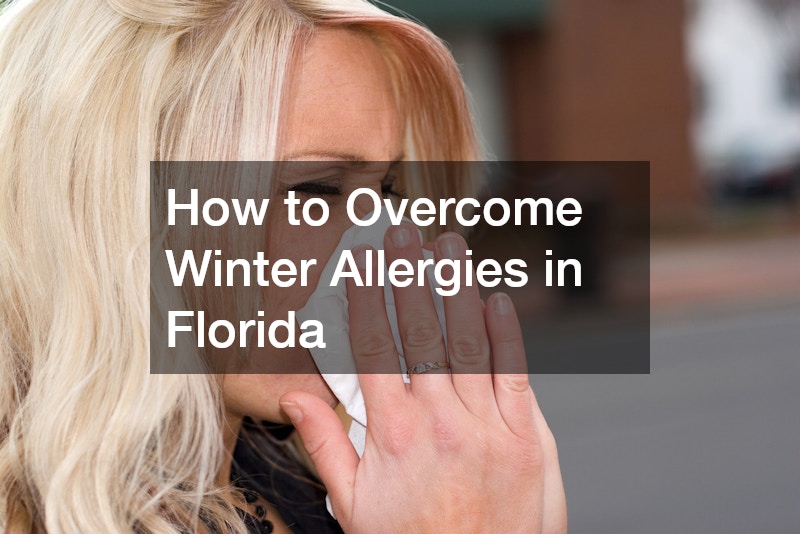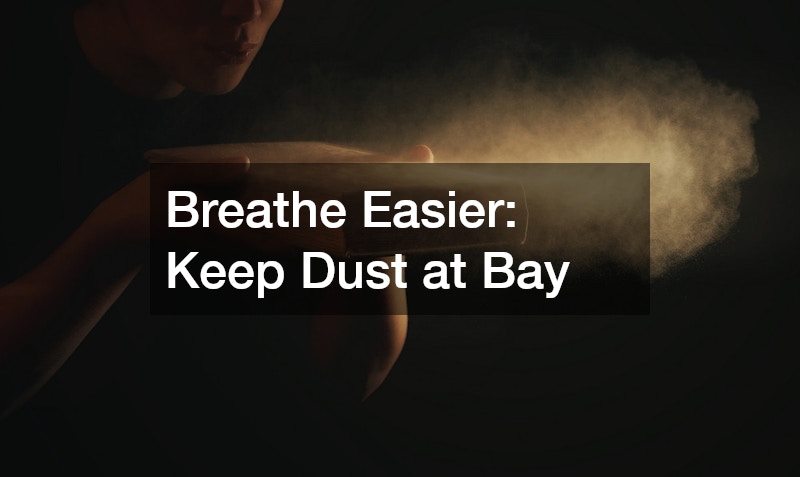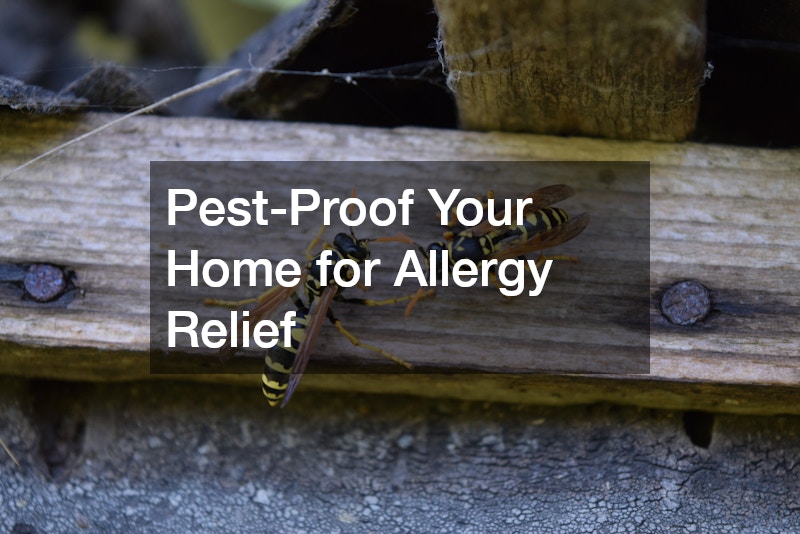How to Overcome Winter Allergies in Florida


Winter allergies in Florida can be just as bothersome as during any other season. While many people associate allergies with springtime, the winter months bring their own set of triggers that can make breathing difficult and exacerbate symptoms. In Florida, where humidity and mild temperatures prevail, allergens like dust, mold, and pollen remain present, causing discomfort to those prone to allergies. The good news is that there are several effective strategies you can employ to alleviate these symptoms. From keeping your home clean to managing outdoor allergens, these steps can significantly improve your quality of life during the winter months.
Despite Florida’s reputation for sunny weather, the mild winters can create the perfect environment for certain allergens to thrive. Dust mites, for instance, flourish in humid climates, and their tiny particles can easily become airborne, triggering sneezing, runny noses, and other allergy symptoms. Mold, too, finds Florida’s wet and warm conditions to be ideal for growth, especially in areas with poor ventilation. Mold spores can be inhaled, causing respiratory issues and aggravating existing allergies. Pollen levels, though lower than in spring, can still be an issue in the winter, as certain plants in Florida bloom year-round.
In addition to these common allergens, the holiday season can introduce new triggers, such as scented candles, artificial Christmas trees, and even the dust stirred up by holiday decorations. The cold weather also means more time spent indoors, where allergens can accumulate in carpets, bedding, and air vents. For many Floridians, the combination of indoor and outdoor allergens makes winter particularly challenging. However, with a proactive approach, it’s possible to reduce your exposure to these irritants and manage allergy symptoms effectively, allowing you to enjoy the season without constant discomfort.

Breathe Easier: Keep Dust at Bay
One of the most common allergens year-round is dust. Dust particles can easily accumulate in your home, triggering winter allergies in Florida. These particles consist of dead skin cells, dirt, pet dander, and other microscopic debris that float through the air, often without us even realizing it. When inhaled, these particles can irritate the respiratory system, causing sneezing, coughing, or even exacerbating conditions like asthma or sinus congestion. To reduce the presence of dust, it’s crucial to maintain clean air in your living spaces. Installing high-quality air filters in your HVAC system can significantly reduce airborne particles. Consider investing in HEPA filters that can trap smaller allergens, providing cleaner indoor air. HEPA filters are particularly effective at capturing even the tiniest dust particles, which are often the hardest to eliminate with standard filters. By improving air quality, you help reduce the impact of dust on your respiratory system, making it easier to breathe and reducing allergy symptoms.
In addition, regularly cleaning vents, baseboards, and shelves can further help eliminate dust build-up and reduce allergy flare-ups. Vacuuming carpets and upholstery with a vacuum cleaner that has a HEPA filter is essential for capturing dust that might otherwise be left behind. Also, don’t forget to wash curtains and bedding regularly, as these fabrics can trap dust and allergens. With consistent cleaning and the right air filtration, you can significantly reduce indoor dust and alleviate symptoms of winter allergies in Florida.
Clean Spaces, Clear Airways
Another essential aspect of managing winter allergies in Florida is maintaining cleanliness throughout your home. Carpets, rugs, and upholstered furniture are notorious for collecting dust, pet dander, and other allergens, making them prime breeding grounds for allergy triggers. These surfaces can trap particles that are difficult to remove with regular cleaning methods. A deep clean using a carpet cleaner can help eliminate these allergens from your floors and fabrics. Steam cleaning carpets and upholstery not only removes surface dirt but also penetrates deep into fibers, ensuring that dust mites, pollen, and pet dander are eliminated. For a more thorough clean, consider hiring professional cleaning services that specialize in allergen removal.
Regular vacuuming with a vacuum cleaner that features a HEPA filter is also a good idea to reduce allergens in high-traffic areas. HEPA filters can trap smaller particles that are not visible to the naked eye, preventing them from circulating in the air. Be sure to vacuum frequently, especially in bedrooms and living areas where allergens are most likely to accumulate. For maximum effectiveness, make sure your vacuum cleaner is equipped with a high-efficiency particulate air (HEPA) filter, which can capture up to 99.97% of dust and allergens.
Additionally, frequent dusting and wiping down surfaces can prevent the accumulation of particles that aggravate allergies. Pay special attention to areas like shelves, windowsills, and blinds, where dust often collects. Using microfiber cloths is a great way to capture dust without simply redistributing it into the air. By keeping your home clean and allergen-free, you’ll find relief from common winter allergy symptoms, such as sneezing, congestion, and itchy eyes. Maintaining a clean environment helps reduce the allergens present, creating a more comfortable living space during the colder months.
Declutter for Better Air Quality
Decluttering your home is another effective method for managing winter allergies in Florida. Piles of clothes, books, and other items can trap dust and make it harder to keep surfaces clean. These cluttered areas often become hotspots for allergens like dust mites, mold, and pet dander, which can aggravate your symptoms. When you have too many things piled up, it becomes increasingly difficult to maintain a thorough cleaning routine. The more items you have, the more surfaces there are to collect dust and the more objects you need to clean. By removing unnecessary items from your home, you can create a more organized environment that is easier to maintain and less prone to dust accumulation.
If you’re not sure where to begin, consider a dumpster rental to get rid of items that no longer serve a purpose. This can be especially helpful for larger items like old furniture, unused appliances, or stacks of old magazines and newspapers. Decluttering your space may also involve sorting through your wardrobe and donating clothes you no longer wear or need. Once you’ve cleared out unnecessary items, you’ll have more space to breathe and less clutter to trap allergens. A more organized living environment helps to reduce the chances of allergens accumulating in places you might not notice, such as under beds or behind furniture.
A clean, clutter-free space will not only make it easier to clean but also help to reduce the number of potential allergy triggers in your home. With fewer surfaces and items to collect dust, you’ll find it much easier to keep your home allergen-free. Additionally, reducing clutter creates a calming atmosphere, which can help reduce stress and improve your overall well-being during the winter months.

Pest-Proof Your Home for Allergy Relief
Pests, such as rodents and insects, are another common source of allergens. During the winter months, these pests often seek shelter inside homes, where they can trigger allergic reactions. The cooler temperatures outside drive them to find warmth indoors, and unfortunately, they bring along a host of allergens. For example, cockroach droppings contain proteins that can cause allergic reactions, especially in people with sensitivities. Rodent urine and feces can also trigger asthma or allergic rhinitis. The presence of these pests in your home can significantly worsen symptoms of winter allergies in Florida, especially if they are not dealt with promptly.
Pest management is crucial for preventing these irritants from making their way into your home. The first step is to perform a thorough inspection of your home’s exterior. Look for gaps, cracks, or holes in your walls, around windows, doors, and pipes where pests might gain entry. Even small openings can be a gateway for rodents and insects to sneak in. Once you identify these vulnerable areas, sealing them with caulk or weather stripping can help keep pests out. For larger cracks or gaps, consider using steel wool or expanding foam as an additional barrier.
Hiring a professional pest control service is an effective way to ensure that your home is properly sealed and protected from unwanted guests. Pest control experts can provide a comprehensive inspection, identify problem areas, and offer solutions to eliminate any pests that may have already infiltrated your home. They can also treat areas where pests are likely to hide, such as attics, basements, or crawl spaces, with safe and effective methods that minimize the risk of further infestations. By eliminating pests and preventing them from entering, you can reduce your exposure to allergens like dust mites, cockroach droppings, and rodent urine, helping to alleviate the symptoms of winter allergies in Florida.
Seal Out Pollen
Even in Florida’s mild winter months, pollen can still be a concern. While pollen counts are typically lower than during the spring season, certain plants in Florida, such as pine trees and grass, can release pollen throughout the year. For individuals who have a history of winter allergies in Florida, this persistent pollen can exacerbate symptoms, making it difficult to breathe and causing sneezing, itchy eyes, and congestion. It’s important to take steps to minimize your exposure to outdoor allergens, especially if you’re sensitive to pollen.
One effective way to reduce your exposure to pollen is by investing in quality window manufacturing. Windows with proper seals and screens are essential for preventing allergens from entering your home. When selecting windows, consider double-paned windows with airtight seals that can reduce the amount of pollen and dust that infiltrates your living spaces. Screens on your windows can also help filter out larger particles, such as pollen, while still allowing for fresh air to circulate indoors. Be sure to check that your window seals are intact, as worn or cracked seals can allow allergens to seep inside.
Additionally, it’s a good idea to avoid opening windows during times of high pollen counts. Pollen levels tend to be higher during the early morning and evening, so keeping windows closed during these periods can help prevent allergens from entering your home. To stay informed about pollen levels, you can check local pollen forecasts or use apps that provide real-time updates. By preventing outdoor allergens from entering your home, you can create a more comfortable living environment and avoid triggering allergy symptoms. This simple yet effective measure can make a significant difference in reducing the impact of winter allergies in Florida.
Boost Air Quality with Proper HVAC Maintenance
When dealing with winter allergies in Florida, it’s important to make sure your appliances are working efficiently, especially your HVAC system. A well-maintained HVAC system is crucial for ensuring that the air circulating throughout your home is clean and free from dust, mold, and other allergens. Over time, dust and debris can accumulate in your air ducts, reducing the effectiveness of your HVAC system and causing allergens to be released into your home. Air duct repair and sealing can help ensure that your HVAC system is circulating clean air, which will significantly reduce the presence of allergens in your indoor environment.
It’s essential to have your ducts inspected and cleaned regularly to prevent the build-up of allergens inside your vents. Professional air duct cleaning services use specialized equipment to remove dust, mold, and other contaminants that can trigger allergies. This cleaning process not only improves the air quality but also helps the system run more efficiently, reducing energy costs.
Sealing any leaks in your ductwork is another important step. Leaks can allow dust, dirt, and other particles to enter your home, even when the system is running. By properly sealing the ductwork, you’ll keep these irritants out and help maintain a healthier indoor environment. Properly maintained air ducts will improve air quality, reduce the likelihood of allergic reactions, and provide you with cleaner, more breathable air during the winter months.

Seal the Gaps: Protect Your Foundation
If your home has cracks in the foundation, it can allow dust, mold, and other allergens to enter your living space. These gaps provide an easy pathway for outdoor allergens to seep inside, worsening your winter allergies in Florida. To prevent this, it’s important to regularly inspect your foundation for any cracks or gaps. Applying spray foam insulation to these areas can help seal them, preventing the infiltration of allergens from the outside. This will also improve your home’s energy efficiency by keeping warm air inside and reducing heating costs during the winter months. By taking steps to protect your foundation, you can ensure that your indoor air quality remains clean and free from allergens, providing a healthier environment throughout the season.
Mow Away Pollen: Keep Your Lawn Allergy-Free
During the winter months in Florida, pollen can still be a problem, especially for those with allergies. While pollen counts may be lower than during the spring, certain plants in Florida continue to release pollen year-round. One way to minimize your exposure to outdoor allergens is by cutting down on the amount of pollen around your home. If you have a lawn or garden, consider using a zero turn mower to efficiently manage the grass and foliage. This type of mower is designed to maneuver easily and trim overgrown plants and grass with precision, allowing you to maintain your yard while reducing the amount of pollen that can be released into the air. A tidy lawn with well-maintained grass and plants helps limit pollen sources, keeping allergens at bay. By reducing the pollen around your home, you’ll experience fewer allergy symptoms indoors, creating a more comfortable living environment during Florida’s mild winter months.
Outdoor Clean-Up: Keep Allergens Out
While you may focus on keeping your home clean, it’s also important to maintain cleanliness outside. Dust and debris can accumulate on your patio, driveway, and yard, which can affect indoor air quality when tracked inside. When you or your family members step outdoors and bring in particles from the exterior, it can contribute to the allergens circulating within your home. Hiring a chimney cleaner or pressure washer to clean the exterior of your home can help remove accumulated dust, leaves, and other debris. A chimney cleaner can also ensure that your chimney is free of pollutants like soot and ash that can contribute to respiratory issues. Pressure washing the exterior surfaces of your home, including the patio, driveway, and walkways, can eliminate dirt and dust, ensuring your outdoor environment remains dust-free. By investing in professional cleaning services for your home’s exterior, you can reduce the chance of allergens entering your home and improve your overall air quality.

Boost Your Immunity with Vitamin C
While environmental factors play a significant role in winter allergies in Florida, your diet can also impact your immune system and overall health. Incorporating foods rich in vitamin C, such as citrus fruits, leafy greens, and bell peppers, can help strengthen your immune system and reduce allergy symptoms. Vitamin C has been shown to have anti-inflammatory properties that can alleviate allergic reactions. Start your day with the best breakfast, incorporating vitamin C-rich foods to support your immune system and keep your body in top form during allergy season.
Winter allergies in Florida can be a challenge for those sensitive to allergens like dust, pollen, and mold. However, by implementing a few proactive measures, you can significantly reduce the impact of these allergens on your health. From keeping your home clean and free of pests to ensuring proper air circulation, every step you take will help alleviate allergy symptoms. By managing the indoor environment with clean air, sealed windows, and regular maintenance, you’ll be able to enjoy a more comfortable and allergy-free winter season. Additionally, incorporating healthy habits like a vitamin-rich diet can help strengthen your immune system and improve your overall well-being. With these strategies, you can conquer winter allergies and breathe easier, no matter the season.